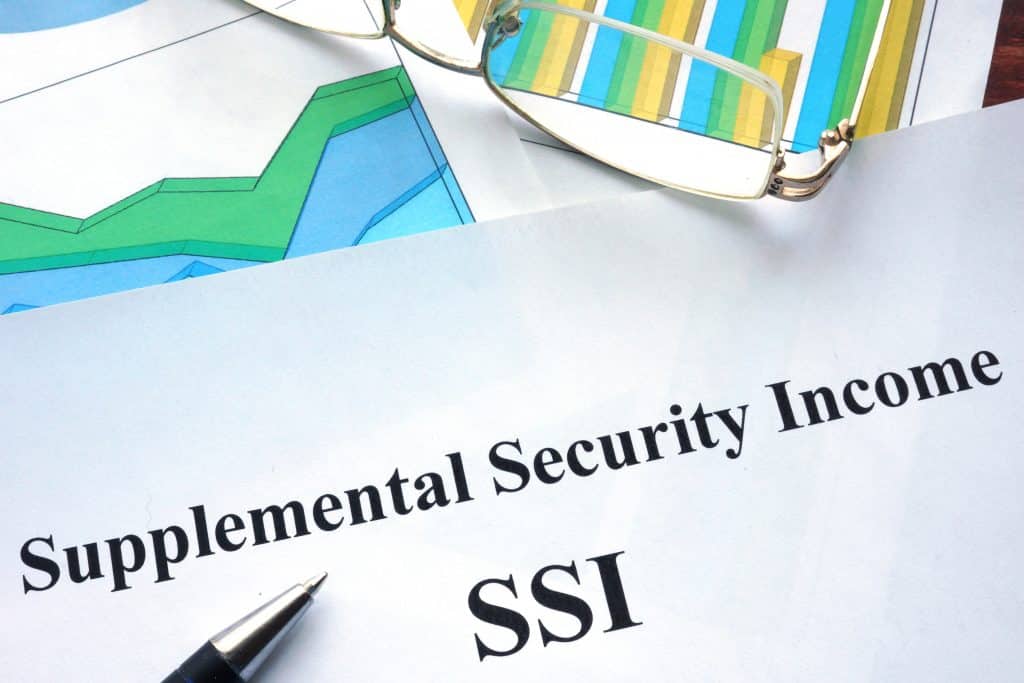Supplemental Security Income (SSI) is a safety net for certain individuals with low income and little assets. SSI provides money so these people can meet their basic needs: a roof over their heads, food, and clothing.
Is SSI the same thing as Social Security Disability (SSDI)?
No. While many people confuse SSI with Social Security Disability Insurance (SSDI), they are two completely different programs that receive their funding from different sources. Money withheld from your paycheck for Social Security funds SSDI. General tax revenues fund SSI. The confusion arises because the Social Security Administration (SSA) administers both SSI and SSDI.
Do I qualify for SSI payments?
In order to qualify for SSI benefits, you must be:
- At least 65 years old, blind, or disabled; and
- Have little or no income and very few assets; and
- Be a U.S. citizen, national, or “certain category of alien”; and
- Be a U.S. resident who has not been out of the country for more than 30 consecutive days; and
- Not confined to an institution paid for by the government
What can make me ineligible for SSI, even if I meet the medical and financial requirements?
You can be ineligible to receive SSI benefits if:
- You are in prison, a detention center, a halfway house, or other type of incarceration other than house arrest.
- You are in a publicly-funded institution, unless it is an emergency homeless shelter or publicly operated community residence.
- You give away or sell your resources below market value in order to get your assets below the limited resources cap (this can make you ineligible for SSI for as long as three years).
- You have an outstanding felony warrant.
- You have an outstanding arrest warrant for fleeing custody or related charges.
- You leave the United States for a month or more, unless you are in a student study abroad program or a child of military parents stationed outside the United States. After you return, you must be in the U.S. for 30 days consecutive days before you will become eligible again.
- You are a non-citizen who does not meet alien status requirements.
To be a “qualified alien,” you must meet one of the following:
- You are a refugee or asylee.
- The U.S. granted you “conditional entry” under the Immigration and National Act (INA).
- The government is withholding your deportation under Section 243(h) or 241(b)(3) of the INA.
- You are a Cuban or Haitian entrant under the Refugee Education Assistance Act.
What assets count under the “limited resources” requirement of SSI?
To be eligible for SSI, you can only have $2,000 in assets for an individual, $3,000 for a couple. The SSA will count things you own toward the “limited resources” cap. These things can include:
- Cash
- Money in bank accounts
- Investments
- Land
- Vehicles
- Personal property
The SSA does not count your home, personal effects, burial plots or funds, one of your vehicles, and grants or scholarships.
Can a child receive SSI payments?
Yes. In order to be eligible for SSI benefits as a child, the person — who must be blind or disabled — cannot be married or the head of a household. The person must be either under the age of 18, or under the age of 22 and attending school regularly. A child can be eligible for SSI benefits the day s/he is born, if she meets the requirements.
Until the child reaches the age of 18, the SSA will evaluate him/her under the child standards for disability.
Is there a way to expedite the process if I have a very serious condition?
Yes. The SSA developed the Compassionate Allowances (CAL) Initiative to rush applications for certain very serious conditions. CAL conditions include certain cancers (e.g., acute leukemia, adult non-Hodgkin’s lymphoma, inoperable breast cancer, child lymphoma, etc.), certain syndromes (e.g., Eisenmenger syndrome, Dravet syndrome, etc.), and other severe conditions.
What can I buy with my SSI payments or my child’s SSI payments?
You must first provide for food and shelter with your SSI funds. After you have covered food and shelter, you can use any remaining funds for uncovered medical and dental expenses and personal needs, such as clothing and “personal comfort items.”
If you are administering funds for an SSI recipient who is in a nursing home or institution, you can use the funds to pay his/her fees. The SSA suggests you set aside at least $30 every month for his/her personal needs.
Can I apply online for SSI benefits?
You can apply online in some circumstances, although Social Security has been working to make an online application available to everyone.
A disabled adult can apply for SSI by making an appointment or calling their local Social Security office (Raleigh office number: 1-877-803-6311).
To apply for SSI benefits for a child, you must complete two forms: an Application for Supplemental Security Income AND a Child Disability Report.
A disabled person age 65 or older can start the application process by either calling his/her local Social Security office or calling 1-800-772-1213. The TTY line for deaf or hard of hearing is 1-800-325-0778.
How can I get help?
The claim process for SSI is difficult. The forms are complicated and confusing. The red tape is frustrating. The Social Security disability lawyers at Lunn & Forro, PLLC will take that burden off your shoulders and help you navigate the application process. We will listen to you and treat you with the compassion and respect you deserve.
Call us today at 888-966-6566 to schedule a free, no-obligation consultation to see how we can help you.
Related Posts

What is a consultative exam?
A consultative exam is ordered when Social Security believes that they need more medical information to make a decision in your case. This exam is

How Do I File a Disability Appeal?
You gave Social Security Disability all the information they asked for and agreed to a medical exam, but your disability claim was still denied. It

How Much Does a Disability Lawyer Cost?
Lawyer fees in Social Security cases are contingent. So the short answer is that it costs you nothing up front to hire a lawyer at

How Long Does It Take to Get Social Security Disability?
“How long does it take to get Social Security Disability benefits?” is probably the most common question that our clients ask. Every case is different,
Do I Need a Disability Lawyer to get SSDI?
Many people wonder if they really need the help of a disability lawyer to obtain their Social Security benefits. You May Not Need a Disability
Notice of Hearing – Social Security Disability
The wait for a disability hearing varies from a few months to over a year, and once the Request for Hearing is filed, you will
I fired my disability lawyer. Now I need a fee waiver. What do I do?
Whenever a disability lawyer withdraws from a case, either on their own or at their client’s request, they must decide whether or not to waive
The Role of a Social Security Disability Attorney
When people are faced with applying for Social Security disability benefits, many wonder if it is worthwhile to hire an attorney. After a life-altering disability



